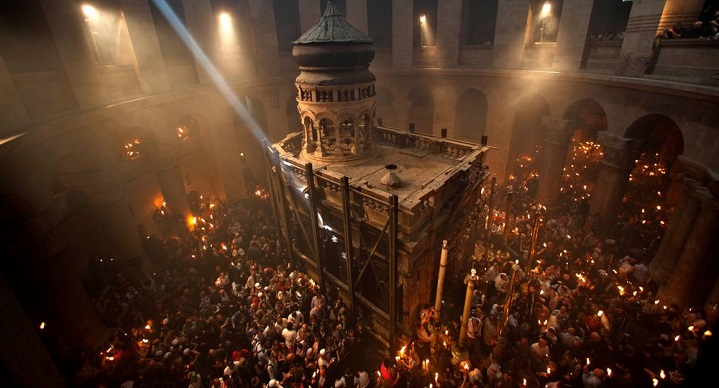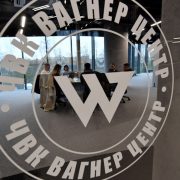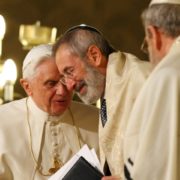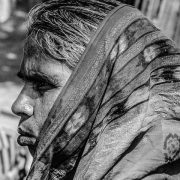
Appello alle Chiese del Medio Oriente per un impegno attivo nel cercare percorsi di pace e soluzione della crisi umanitaria che affligge la regione.
English Version Below
Eminenze, Beatitudini, Patriarchi di rito cattolico e di rito ortodosso delle Chiese del Levante arabo, quella terra tagliata dall’accetta dei colonialisti europei in Paesi che sotto il peso di questo peccato d’origine non sono mai diventati Stati dei loro cittadini.
Con umiltà mi permetto di scrivervi questa breve lettera – anche se molto più avrei da dirvi – perché voi sapete che il Levante sta morendo, e con esso la sua cultura; perché il Levante arabo, e quindi anche arabo cristiano, è cosmopolita, o non è. Questo lo attesta la sua storia, compresa la nobile e rimossa storia del cristianesimo di Gaza, quella terra oggi di miseria, sangue e distruzione che in un lontano passato diede al Levante uno dei più importanti monasteri, Tell Umm Amer, luogo di ristoro spirituale per pellegrini e viandanti, magari commercianti, in cammino tra l’Egitto e la Terra Santa. Tell Umm Amer è un lontano ricordo, come tutto a Gaza oggi è un ricordo. Ma il monastero aveva una missione precisa: essere luogo di ristoro fisico e spirituale per l’umanità in cammino. Questa storica e acclarata definizione all’improvviso gli restituisce un’attualità sconvolgente dopo un lungo periodo di oblio.
Come sapete Tell Umm Amer è legata a sant’Hilarion, pioniere nel IV secolo del monachesimo cristiano in quelle terre. Chi non può riconoscere in questo antico e dimenticato simbolo del cristianesimo del Levante un messaggio sul domani davanti a questo presente? Cosa più di Tell Umm Amer può parlare oggi del Levante? Gaza non può essere un terminale invalicabile in un senso o nell’altro, ma un luogo di ristoro lungo il cammino. Non è questo il senso del Levante?
La cultura levantina ha cominciato a morire quando, dopo le guerre del ’48, intere comunità ebraiche sono state costrette a lasciare i loro Paesi di nascita: per quanto di vostra competenza, illustri Patriarchi, ricorderei soprattutto quanto accadde in Siria, Libano e Iraq.
Questa scelta disastrosa ha seguito un impianto culturale che ben viene espresso dal nome che assunse il blocco arabo che rifiutava ogni negoziato con Israele: il «Fronte del rifiuto». Qual era il discorso? È molto semplice: «voi espellete i palestinesi dalla Palestina, noi allora vi espelliamo dalle nostre». Così la cultura levantina ha cominciato a sgretolarsi, perdendo una parte del filamento che ne costruisce il tessuto.
Oggi il destino delle vostre comunità cristiane appare simile e comunque analogamente segnato, ovunque. In Libano, in Siria, in Iraq, in Giordania, in quella che chiamate Terra Santa, i cristiani ormai sono un rimasuglio per molti destinato a sparire. L’agonia del Paese che avevate reso la banca del mondo arabo, l’università del mondo arabo, la scuola del mondo arabo, l’albergo del mondo arabo − cioè, l’agonia del Libano − è la riprova dell’agonia del cristianesimo levantino, tutto. Può sopravvivere, ma non sa più essere influente come era stato soprattutto nel grande Ottocento, quando i cristiani furono protagonisti, con molti musulmani, della esperienza della Rinascita, del Risorgimento arabo, dopo l’opaca epoca ottomana.
Purtroppo, nel Novecento lo scaltro cinismo del colonialismo europeo vi ha reso agli occhi di molti, per errore di tutti, «le quinte colonne» del colonialismo europeo. Un ruolo, quello di quinte colonne, che oggi si riduce alle facilitazioni che vi vengono «generosamente» concesse per ottenere più facilmente i visti per emigrare. In queste condizioni è ovvio ritenere che il cristianesimo non possa più essere influente e che appaia destinato a sparire.
Così l’islam arabo sarebbe condannato alla solitudine. Con voi sparirebbe anche l’ultima finestra che apre quel mondo al dialogo e all’incontro con il resto del mondo. Certo, Oriente e Occidente oggi si parlano direttamente, ma senza avere un tessuto comune, quello levantino, antefatto e premessa indispensabile del tessuto mediterraneo. Sarebbe la fine di una civiltà, una civiltà della quale noi siamo parte, pur avendolo dimenticato. Non siamo forse mediterranei anche noi?
Ma prima che il Mediterraneo muoia, io sono convinto che voi possiate ancora esercitare influenza. Perché non è vero che voi, i patriarchi delle terre del Levante, non siate più ininfluenti. Voi avete guidato dall’Oriente – a mio avviso erroneamente – il nostro sostegno ai vostri regimi nella loro «guerra al terrorismo», segnatamente in Siria. Lo avete fatto capovolgendo la dottrina della Chiesa, non solo di Roma, che ha sempre criticato la «guerra al terrorismo», da quando fu teorizzata nel 2003 con l’invasione dell’Iraq. La «guerra al terrorismo» produce più terrorismo, si disse, e nel caso dell’Iraq anche la consegna del Paese al nemico che gli invasori volevano combattere, l’Iran. Oggi le milizie iraniane si permettono di espellere impunemente uno di voi, il patriarca caldeo di Baghdad, costringendolo a cercare riparo nel Kurdistan iracheno.
Nel legittimare l’idea della «guerra al terrorismo» che, pensando di difendervi, avete difeso, non vedendo la persecuzione dell’intero popolo siriano, con tanto di deportazione di milioni di inermi siriani; e il ruolo che avete svolto nel mondo cristiano, soprattutto europeo e americano, è stato evidente. Avevate vostri inviati, come madre Agnese de la Croix, che battevano palmo a palmo tutto l’Occidente cristiano nel nome della «guerra al terrorismo». La vostra influenza − che io non ho condiviso − è stata però oggettivamente potente.
Oggi, si torna a confidare che la «guerra al terrorismo» sia lotta al terrorismo. Nella vostra odierna contrarietà il vostro ruolo potrebbe essere altrettanto influente. Ma come?
La vecchia «ideologia del rifiuto» è fallita, quel poco che ne è rimasto in alcuni partiti non fa altro che legittimare il terrorismo. La lotta al terrorismo però resta vitale, e dovrebbe partire dalla necessità di difendere il tessuto levantino, quel tessuto che è cosmopolita o non è. Dunque, per prima cosa siete chiamati a evitare che si chiuda l’ultima finestra araba, quella cristiana, in un edificio che altrimenti potrebbe guardare solo dentro di sé, come le vecchie, tradizionali, case arabe che guardano solo sui patii interni. Dunque, non la chiusura, ma l’apertura dovrebbe essere la vostra cifra. A partire da lei: da Gerusalemme.
Sì, voi potreste, tutti insieme, tornare a Gerusalemme. Non proibire i pellegrinaggi, come alcuni hanno fatto in segno di «rifiuto», comprensibile, ma sterile, se non dannoso. Voi potreste tornare a Gerusalemme riunendovi lì, tutti insieme. Non ritengo che vi possano essere negati i visti e non credo che i vostri regimi vi possano condannare per questo. In occasione del viaggio del papa nel 2005 uno di voi, il patriarca maronita, lo ha già fatto. È previsto che possiate farlo. Il rischio sarebbe minimo, nessuno ve lo potrebbe impedire.
Questo gesto per me parlerebbe al mondo: e parlerebbe di apertura, accettazione, inclusione, rispetto. Rispetto dell’altro, rispetto di sé. Rispetto della storia, e quindi rispetto delle storie, e quindi rispetto non solo dei simboli (le pietre, i muri delle chiese) ma anche degli ulivi, dei campi, dei villaggi, di ciò che fa vivere le comunità che quei simboli rendono vitali.
Una settimana di riunione plenaria dei patriarchi di tutto il Levante a Gerusalemme invocherebbe l’apertura, non la chiusura, il rispetto, non la sopraffazione, l’incontro, non l’isolamento.
Oggi la vostra voce è scomparsa dal confronto sul futuro di una terra che non rivendicate solo per voi. Proprio questo, la rinuncia agli errori del passato − simboleggiato dalla Custodia affidata agli eredi chi incontrò il sultano − potrebbe parlare a tutti i protagonisti e anche ai nostrani antigiudaici e antisemiti, come ai nostrani islamofobi, che in questo vento rifiutano il messaggio essenziale del Levante, che è cosmopolita, o non è. Così ci aiutereste anche a curare noi stessi.
Con stima,
Riccardo Cristiano
English Version
Your Eminences, Beatitudes, Patriarchs of Catholic and Orthodox rite of the Churches of the Arab Levant, that land cut by the axe of European colonialists into countries that under the weight of this sin of origin never became states of their citizens.
With humility I allow myself to write you this very short letter (there would be much to tell you) because you know that the Levant is dying, and with it its culture; because the Arab Levant, and therefore also Arab Christian Levant, is cosmopolitan, or it is not. This is attested by its history, including the noble and removed history of Christianity in Gaza, that land today of misery, bloodshed and destruction that in the far past gave the Levant one of the most important monasteries, Tell Umm Amer, a place of spiritual refreshment for pilgrims and wayfarers, perhaps traders, on their way between Egypt and the Holy Land. Tell Umm Amer is a distant memory, as everything in Gaza today is a memory. But the monastery had a specific mission: to be a place of physical and spiritual refreshment for humanity on its way. This historic and acclaimed definition suddenly restores it to shocking relevance after a long period of oblivion.
As you know Tell Umm Amer is linked to St. Hilarion, a pioneer in the fourth century of Christian monasticism in those lands. Who cannot recognize in this ancient and forgotten symbol of Levant Christianity a message about tomorrow in the face of this present? What more than Tell Umm Amer can speak of the Levant today? Gaza cannot be an impassable terminal one way or the other, but a place of refreshment along the way. Isn’t this what the Levant is all about?
Levantine culture began to die when, after the wars of ’48, entire Jewish communities were forced to leave their countries of birth: to the best of your knowledge, distinguished Patriarchs, I would recall especially the expulsions from Syria, Lebanon and Iraq.
This disastrous choice followed a cultural framework that is well expressed by the name that assumed the Arab bloc that refused all negotiations with Israel: the “Front of Denial.” What was the discourse? It is very simple: “you expel the Palestinians from Palestine, we then expel you from ours.” Thus the Levantine culture began to crumble, losing part of the filament that builds its fabric.
Today the fate of your Christian communities appears similar and at any rate similarly sealed. In Lebanon, in Syria, in Iraq, in Jordan, in what you call the Holy Land, Christians are now a remnant for many destined to disappear. The agony of the country that you had made the bank of the Arab world, the university of the Arab world, the school of the Arab world, the hotel of the Arab world — that is, the agony of Lebanon — is evidence of the agony of Levantine Christianity, as a whole. It may survive, but it no longer knows how to be as influential as it had been especially in the great nineteenth century, when Christians were protagonists, with many Muslims, in the great experience of the Rebirth, of the Arab Resurgence, after the opaque Ottoman era.
Unfortunately, in the twentieth century, the cunning cynicism of European colonialism made you in the eyes of many, by mistakes of all, “fifth columns” of European colonialism. A role, that of fifth columns, which today is reduced to the facilities “generously” granted to you in order to obtain visas to emigrate more easily. Under these conditions it is obvious to assume that Christianity can no longer be influential and appears doomed to disappear.
Thus Arab Islam would be doomed to loneliness and with you will be disappearing the last window that opens that world to dialogue and encounter with the rest of the world. Of course, East and West today speak directly to each other, but without having a common fabric, the Levantine one, antecedent and premise indispensable of the Mediterranean fabric. It would be the end of a civilization, a civilization of which we are part, though we have forgotten it. Are we not also Mediterraneans?
But before the Mediterranean dies I am convinced that you can still exert influence. For it is not true that you, the patriarchs of the lands of the Levant, are no longer influential. You have led from the East, wrongly in my opinion, our solidarity with your regimes in their “war on terror,” notably in Syria. You have done this by reversing the doctrine of the Church, not only of Rome, which has always criticized the “war on terrorism” since it was theorized in 2003 with the invasion of Iraq. The “war on terrorism” produces more terrorism, it said, and in the case of Iraq also the surrender of the country to the enemy the invaders wanted to fight, Iran. Today Iranian militias allow themselves to expel one of you, the Chaldean Patriarch of Baghdad, with impunity, forcing him to seek shelter in Iraqi Kurdistan.
In legitimizing the idea of the “war on terror,” which you supported thinking to defend yourself, your community, blind to the persecution of the entire Syrian people, complete with the deportation of millions of defenseless Syrians, the role you played in the Christian world, especially in Europe and America, was evident. You had your envoys, such as Mother Agnes de la Croix, who beat the entire Christian West palm to palm in the name of the “war on terror.” However, your influence, which I did not share, was objectively powerful.
Today you are back to trusting that the “war on terrorism” is not fighting terrorism. In your opposition today, your role could be just as influential. But how?
The old “ideology of denial” has failed; what little is left of it in some parties only legitimizes terrorism. But the fight against terrorism remains vital, and it should start from the need to defend the Levantine fabric, the fabric that is either cosmopolitan or it is not. So, first you are called upon to prevent the closing of the last Arab window, the Christian window, in a building that otherwise could only look inward, as the old, traditional Arab houses looking only on the inner patios. So, not closure, but openness should be your hallmark. Starting from here, from Jerusalem.
Yes, you could, all together, return to Jerusalem. Do not prohibit pilgrimages, as some have done as a sign of “rejection,” which is understandable but sterile if not harmful. You could return to Jerusalem by gathering there, all together. I do not think you can be denied visas and I do not think your regimes can condemn you for that. On the occasion of the pope’s trip in 2005 one of you, the Maronite patriarch, has already done so. It is expected that you can . The risk would be minimal, no one could prevent you.
This gesture for me would speak to the world: and it would speak of openness, acceptance, inclusion, respect. Respect for the other, respect for self. Respect for history, and therefore respect for the stories, and therefore respect not only for the symbols (the stones…) but for the olive trees, the fields, the villages, what makes the communities that those symbols make alive.
A week-long plenary meeting of patriarchs from across the Levant in Jerusalem would invoke openness, not closure; respect, not overwhelm; encounter, not isolation.
A week-long plenary meeting of patriarchs from across the Levant in Jerusalem would call for openness, not closure; respect, not overwhelm; encounter, not isolation.
Today your voice has disappeared from the confrontation over the future of a land you do not claim for yourselves alone. This very thing, the renunciation of the mistakes of the past, symbolized by the Custody entrusted to the heirs of the one who met the Sultan, could speak to all the protagonists and also to our anti-Semites, like our Islamophobes, who in this wind reject the essential message of the Levant, which is cosmopolitan, or it is not. Thus you would also help us to heal ourselves.
With esteem,
Riccardo Cristiano





